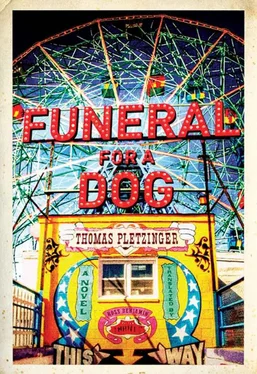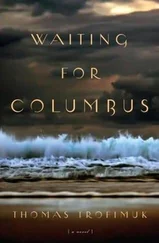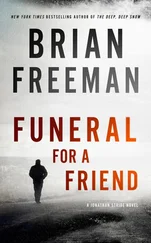and on this cue Kiki Kaufman reaches into her bag. Those are the pictures that everyone knows, she says, and that she already photographed off a television in Chicago, in a salad bar on the Magnificent Mile. That afternoon she threw her things in the car and drove to New York. Since then I’ve been a camera, says Kiki Kaufman, elegantly rolling the tobacco in the paper, in front of the SoHo Grand smoking is still permitted, but that will probably change soon. Can she offer me one, she asks, but I say that I actually smoke only in exceptional situations, but she can roll me one. I collect cigarettes, it’s hard to explain. Yes, says Kiki, this world is hard to explain. She rolls the cigarette, then hands it to me, and I repeat that
I walked all the way from the office back to Brooklyn, through Queens, then on the Pulaski Bridge, in Greenpoint and later through Williamsburg, past the shards and garbage bags by the river, through the smell of yeast dough from the Polish bakery on Manhattan Avenue. In front of Enid’s the old Poles from the building were standing on the street and holding cans of beer in their hands. I tried calling Tuuli or Felix from a pay phone. Nothing. I didn’t get through. Maybe Felix was searching for her, maybe he’d found her. What a fucked-up mess, said one of the Poles, and gave me a Pabst Blue Ribbon, he said, Joseph Barach, Bialystok, and because I didn’t know how else to respond, I said my name and where I was from. Germany? asked Joseph Barach. He crushed his Pabst can and immediately opened another. Fuck, he said, four in the afternoon and I’m standing with a German in the middle of Manhattan Avenue and drinking beer? An old Polack like me! No way I would have done that yesterday, kiddo! What else should we have said? The Poles held out the beer cans to me like earthenware jugs in the Bohemian Hall, they looked down the street and across the river, the plume of smoke was turning in our direction, I waited awhile longer in front of Enid’s, no police car forbade the drinking on the sidewalk, more and more people were standing around and drinking, but neither Felix nor Tuuli showed up. Around five the sun shone lower, around six we could smell the smoke, and Joseph Barach lifted his beer the way other people drop an anchor. The world and its beer brands are going downhill, he said. That whole warm September day all I had to drink was beer with the old men in front of Enid’s, and then I at least sat with Felix and Rolling Rock on my sofa on Lorimer Street in Brooklyn and we waited together for Tuuli, for word from her. Around seven, I went to the fridge and gave Lua a cold cheeseburger to eat.
Lua likes cheeseburgers, says Kiki, she knew that already. Yesterday she had been photographing the half-naked bakers in front of their ovens before she found me and Lua, that direct rawness, that perceptible heat, the belly of the city. Lua and I seemed to her like the image of the amputated country. That’s a different subject, I reply, but I still haven’t gotten to my own, I’ll stick to it, it’s still about
Tuuli, seven months pregnant and still not there. We didn’t know where she was, we were too anxious to talk nonsense. On the answering machine, there were twelve messages from Germany, we couldn’t call back, we wanted to keep the phone line free for Tuuli. Felix, Lua, and I sat around and watched the airplanes on television, the fire, the running people, the dust clouds, the updates, eyewitness reports and amateur videos, the we-will-hunt-them-down-and-punish-those-responsible loop. When there was a knock at the door, we gave a start. In the doorway stood Tuuli, in jeans and a bright purple PricewaterhouseCoopers promotional T-shirt that was actually much too large. She’d rolled up her pants legs, the T-shirt stretched over her belly. She looked like she was in disguise, her pregnant belly seemed, like the clothes, not to belong to her body. In her hand she was holding Felix’s huge leather suitcase. I’m sorry, she said, looking around the room. The light on the unwashed windowpanes was dark orange, almost red. In the morning she’d been standing on the roof terrace and observing the burning of the towers as if paralyzed, then the first one came down. The hotel was evacuated, she’d had to put on a gas mask. She’d gone down the stairs and out of the building, by boat to New Jersey, and came here over the bridges to the north. She hadn’t been able to reach us. She was sorry. In the suitcase there was only a bathrobe. Felix fell back on the sofa, he let out air like an inflatable animal from which the plug has been pulled. Your pants are too big, he said weakly, the T-shirt color looks fantastic on you. I turned down the television, Mayor Giuliani at a press conference, they were now certain that there was no poison gas on board and that there were no biological agents. In the factories of New Jersey, Tuuli whispered, they wear clothes like these, then Felix put a hand on her dust-covered cheek. It’s all right, he said, we were worried about you. There’s still chocolate ice cream in the fridge, I said. Felix opened two more beers and we watched Tuuli as she very intently and carefully spooned the whole cup of ice cream. Here we were and we couldn’t get away, no trains were leaving, no buses were running, no airplane was permitted to take off, all the bridges were closed. We expected the worst and had no idea what the worst could be, but
Kiki interrupts me at this point. I can imagine the light, she says, setting her glass on the knee-high table, not the worst. She wakes Lua and positions his head on the arm of my chair, she takes a picture of the two of us through her wine glass. You guys are drunk again, says Lua, and I’m glad he’s finally breaking his silence, because he’s been too quiet today, and Kiki Kaufman with the camera doesn’t object when I gesture for more wine, when I decline to taste and approve, when the waiters in light of my story and the camera finally replace Kiki’s white wine glass with a larger one. She presses the shutter release and raises her filled glass first to me, then to the window and toward the sky, as if she were saying thanks for the invitation. She nods as if she were joining Tuuli and Felix and me, as if she were climbing with her camera out the window and up the fire escape to us and sitting down with us on the edge of the roof, as if she were watching
as Tuuli wiped the dust off the lens of her camera with her sleeve. We were sitting on the roof over Lorimer Street. The answering machine in the apartment clicked on, Lua howled with the sirens. Felix and I took turns climbing down to get more beer. The lines were jammed, we couldn’t use the phone. Tuuli stared for a long time at a blank billboard over the Brooklyn-Queens Expressway, which obstructed the view of the place where that morning the towers had still stood. She looked mellower now than she had at the kitchen table. Felix was talking about the smoke cloud, how strangely beautiful and aflame it was in the sunset, and Tuuli’s tears smeared the ash on her face. Felix sat down next to her on the edge of the roof and said, your tears are smudging. He leaned toward her for a kiss. In one hand he was holding a beer can, the other was placed on the fine blonde hair on the back of Tuuli’s neck. I kneeled down between the two of them, took the camera, and Felix lifted his beer into the picture at the right moment and asked
Can you look right over here? Kiki stops me, and I hold my glass up to her camera eye. Please don’t interrupt me, I say, cameras don’t talk. I’m drunk, I hold on to Lua’s collar, I put down the wine, and Kiki photographs herself and me and Lua in the dark window and West Broadway in the rain on the other side. I remember
the sky like a soap bubble over the roof of 37 Lorimer Street, the sun behind the smoke and the billboard, the pale searchlights over lower Manhattan, familiar from operating rooms and film sets. I remember Felix and Tuuli sitting next to each other on the edge of the roof and more and more ambulances on the BQE. How Tuuli began to roll a joint for us, how she watched her fingers as she did so, how she sang softly to herself, how Felix and I listened to ourselves breathing, how Tuuli’s song mingled with the singing of the Latino regulars in front of Oscar’s corner store below, how Felix stood up after a while and claimed that Colombians were used to things like this: Colombians sang all the time, they had civil war and blown-up airplanes every day, they didn’t even notice days like today anymore, that was a good solution. Anyway, said Felix, did we know that Bryan Adams and Keanu Reeves always shared a hotel room when they were in New York, at the Mark Hotel on Seventy-seventh Street and Madison Avenue.
Читать дальше












